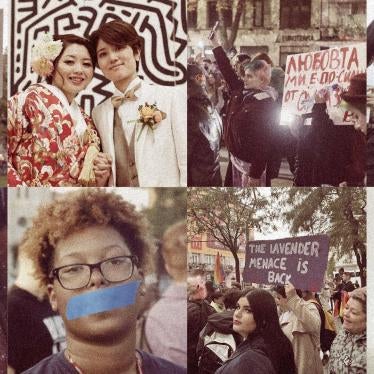Women from 40 countries—nannies, housecleaners, community organizers, and trade unionists—gathered in Uruguay at the end of October to establish the first global federation of domestic workers. There were few television cameras, no celebrities to give a keynote speech, no large commitments of donor aid. In fact there were none of the trappings of the numerous international conferences to fight the enormous social ills of forced labor, trafficking, and labor exploitation.
Yet this modest gathering included some of the most effective and visionary activists for both local and global change, and their growing movement to advance domestic workers’ rights has won remarkable achievements. Their efforts have contributed to the adoption of the ILO Domestic Workers Convention, the first global labor standards for a historically neglected workforce that numbers more than 50 million worldwide. This treaty, adopted two years ago, entered into force on September 5.
The domestic workers’ rights movement has powerful lessons for the broader fight against forced labor, trafficking, and servitude. This fight has often focused heavily on a criminal justice approach, measured by counting prosecutions, but has been relatively vague on how to prevent those abuses from happening in the first place.
Since the domestic workers treaty was adopted two years ago, on the other hand, the people who gathered in Uruguay have helped bring about new laws and other legal advances to protect domestic workers in more than 25 countries. Moreover, they have increased their strength with tens of thousands of new members in their affiliates and partner organizations.
Grim Statistics
The estimates of trafficking and forced labor are staggering. Precise statistics are impossible given the hidden and criminal nature of these abuses, but the International Labor Organization estimates that 20.9 million people are in forced labor. A recent index measuring “modern-day slavery,” released in October by the organization Walk Free, put the figure at almost 30 million for a broader category including forced labor, trafficking, and other forms of servitude such as child marriage.
Domestic work, hidden in private homes and poorly regulated and monitored, is one of the main sectors in which such serious human rights abuses thrive.
These grim figures focus on the worst forms of abuse. But many of the estimated 53 million domestic workers worldwide— mostly women and girls, many of them migrants—experience a wide array of related abuses and labor exploitation. These can include low and delayed wages, excessively long work hours, lack of rest, and hazardous work conditions. It is often the cumulative impact of multiple abuses that amount to forced labor: for example, a worker made to labor around the clock, against her will or under threat of punishment, who cannot leave the workplace freely and who has not been paid in six months. When these kinds of abuses happen to workers who were recruited or transferred through force, fraud, or coercion, this amounts to trafficking.
Addressing the Problem
In the past few decades, government and international initiatives to combat trafficking have proliferated. These have included international law efforts like the UN Trafficking Protocol as well as national laws, public awareness campaigns, training programs for police and prosecutors, and funds for victim services. The United States has played a prominent role, including through the State Department’s annual Trafficking in Persons report, which ranks countries based on the efforts they make to end trafficking.
Progress is being made. However, the protection and rehabilitation of victims of grave exploitation—and the prosecution of perpetrators—is typically complex, challenging, and expensive, and globally efforts have yielded mixed results. Many governments have flawed anti-trafficking initiatives that fail to identify victims, investigate those responsible for abuses, or invest in long-term victim re-integration programs.
There is no secret about the profile of those targeted by unscrupulous employers and recruiters. They are concentrated in weakly regulated and “informal” economies such as domestic work and farm work. They are typically poor and desperate to earn money to put food on the table, pay for school fees, or cover unexpected healthcare costs. More than half of those in forced labor are women or migrants. Millions are children. Many are from marginalized communities with limited access to information, education, and decent work opportunities.
Government policies often exacerbate the vulnerability of marginalized workers instead of protecting them. The International Labor Organization estimates that 30 percent of the world’s domestic workers are employed in countries whose labor laws completely exclude them, giving employers free rein to make them work around the clock for pitiful wages with few avenues for redress. Many others are employed in countries that provide some protection but tend to leave them out of regulations establishing a minimum wage, social security systems, maternity benefits, workday limits, and occupational health and safety measures.
The unique features of work inside private households also make domestic labor poorly regulated and easily exploited. Live-in domestic workers who may be “on call” beyond regular working hours, for example, or who may have part of their remuneration provided through room and board, are especially vulnerable to under-compensation.
Closing the Rights Gap
The growing domestic workers’ rights movement has focused its efforts on advocating robust labor protections to help close the gaps that make exploitation possible. Domestic workers have organized at grassroots, national, and global levels to change how caregiving is recognized and valued. This labor organizing has not only generated pressure for governments to enact reforms but also empowers workers to know and claim their rights.
A landmark achievement for the movement was the negotiation and adoption of the ILO Domestic Workers Convention in 2011. This groundbreaking treaty establishes the first global standards for domestic workers worldwide, entitling them to the same basic rights as other workers while setting forth specific provisions to address the unique characteristics of their employment inside the home.
Ten countries have ratified the treaty: Uruguay, the Philippines, Mauritius, Nicaragua, Italy, Bolivia, Paraguay, South Africa, Guyana, and Germany. Several more are completing the process.
A recent report jointly produced by Human Rights Watch, the International Domestic Workers Network, and the International Trade Union Confederation (ITUC) charts ratification of the treaty, national labor law reforms, and the growing influence of emerging domestic workers’ rights movements in the past two years. Countries as diverse as Brazil, Zambia, the Philippines, Spain, and the United States have made progress on rights for domestic workers.
For example, Argentina set a maximum of 48 working hours a week and required a weekly rest period, overtime pay, annual vacation days, sick leave, and maternity protections. It extended additional protections for live-in domestic workers and for children. Brazil adopted a constitutional amendment entitling its estimated 6.5 million domestic workers to overtime pay, unemployment insurance, a pension, a maximum 8-hour workday, and a 44-hour workweek. In Kenya, a landmark court ruling placed domestic workers under the protection of the labor law, extending to them the national minimum wage and social security benefits.
The Philippines addressed the specific risks faced by migrant domestic workers by prohibiting employment agencies and employers from charging workers recruitment fees. Spain mandated the compensation of domestic workers for stand-by time when they are not working but required to be on call. Spain not only incorporated domestic workers into its social security system but also reduced the administrative charges payable by employers to facilitate greater compliance with the requirements.
The domestic workers who met in Uruguay know that advocating a minimum wage, limits to working hours, and social security may not be as headline-grabbing as arresting traffickers. But they also know that enforcing these rights reduces the risk of exploitation in the first place. Governments serious about ending forced labor and trafficking should ensure that a core part of their strategy includes advancing labor rights for all workers through strong laws, enforcement, and protection of the right to organize.






